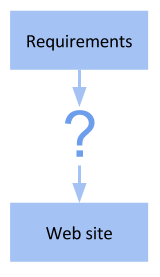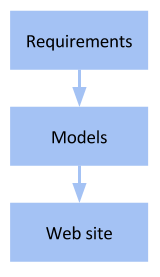Where are we?
We’re building a Web site for Adopt-a-Dog. We started by working out what the site should do for its stakeholders. Here’s what we came up with:
People who want to adopt a dog
- What dogs are available?
- Can I visit the dogs?
- What does it cost to adopt a dog?
- Will I be allowed to adopt a dog?
People with a dog that needs to be adopted
- Can I leave my dog with Adopt-a-Dog?
- Will Adopt-a-Dog look after my dog?
- Will my dog have a good home?
People looking for training, or veterinary services
- What services are available?
- What do they cost?
- When and where can I get services?
People who want to donate money
- How will my money be used?
- How do I donate?
- Are donations tax deductible?
Potential volunteers
- What jobs are available?
- What hours would I work?
- Is there training?
Adopt-a-Dog management
- How is content on the site updated?
- How much time will it take to keep the site updated?
- Where will the site be hosted?
- What will hosting cost?
What models are for
We have some requirements:

We want to make a Web site that meets the requirements:

How do we turn requirements into an IS? That’s what models are for. Models describe what the system does, and how it works.

There are a bunch of modeling techniques in IS. The ones you use depend on what kind of IS you’re building.
We’re making an info collection IS. What models will help?
- Page hierarchy model
- Look-and-feel model
Let’s take a look at the first one.
Summary
We have some requirements. How do we turn requirements into an IS? That’s what models are for. Models describe what the system does, and how it works.
